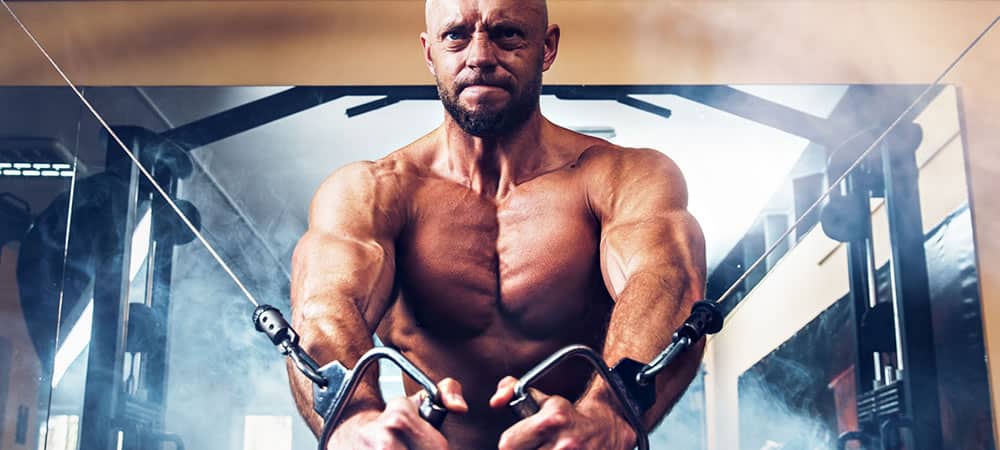Healthy life expectancy in decline
Feb 20, 2026The Best Chest Exercises For Building Huge Pecs
- Aug 3, 2024
- 0 Comments
307

Man boobs aren’t the best, sure, but when your pecs look like they’ve been carved out of marble from the Parthenon, well that’s when you have a chest worth showing off. There’s other benefits to exercising your chest though, apart from resembling an ancient Greek deity.
A bigger chest can ensure you fill out a suit. Strong pecs can also improve your back strength, as well as your ability to push things (and if there’s one thing we know will impress potential love interests it is using your superhero pecs to save a struggling puppy by shoving a car off it’s poorly paw). Plus, unlike the superficial, but ultimately quite useless bulging bicep, a strong chest can make you better at sports, especially those that require you to push and tackle other man mountains around like American football or rugby.
So it’s no surprise that one man who owns a rather impressive barrel of a chest is 77 times capped England rugby international James Haskell. As a flanker, Haskell reckons his position on the rugby field means he probably endures the most hits out of all the other players: “You need good muscle mass on your upper body to weather the collisions,” he says.
Fronting Up
Weighing in at around 120kg, Haskell doesn’t have to get any bigger to improve his performances on the pitch, so his workouts revolve around short but punishingly heavy sets. “To build up strength you want your rep range around one to five and then power is one to three,” says Haskell.
When he was in his teens, though, Haskell came in at a much lighter 95kg. “It was a bit like a Rocky montage. I went from being skinny as hell to starting my first professional contract at Wasps rugby club at 103kg and now I’m 120kg.”
It was during these years of toil that Haskell put on the slabs of muscle that have made him such a difficult man to bring down to the ground through his career. “If you want to build a huge chest you’ve got to be doing around 10 to 12 reps for each exercise. There is no way you can lift really heavy weights for 10 reps. You’ve got to be slow and tightly controlled, making sure you get that concentric movement just right. Take four seconds for each rep and don’t go heavy.
“Break the arrogance and start at the beginning, telling yourself, ‘I’m going deliver this rep with real control’. It’s painful, it’s boring and you might look [weak] doing it with a 2kg dumbbell. But listen, at the end of the day that is how you will build the bigger body.”
If you’re going to be putting in all that hard, gut-wrenching work in the gym, you’ve also got to supply your body with enough fuel to keep that chest swole throughout the day. “A lot of lads who want to build muscle don’t eat enough,” reveals Haskell. “There’s a lot of guys out there training five times a week and you ask them to track what they’re eating and it only comes to 1,000 calories a day.
“Now, for me to stand still every day I need 2,500 calories. So to maintain my mass I have to have 3,500 calories at least. If you’re burning 1,200 calories a day and you’re not even eating that you’re always going to be losing. You need to plan it out before you start – how much are you training? Get an idea of how much you’re burning per session and then work out your calorie surplus from that.”
James Haskell’s Go-To Chest Exercises
Exercise 1: Incline Dumbbell Press
Haskell recommends making the incline press your big chest compound workout as opposed to traditional flat bench press. “I’m not a massive fan of bench press. It obviously works your chest but compare it to the press up, which is my favourite chest exercise. If you imagine you’re doing press ups on the floor, you don’t actually physically do this but your mindset is to push the floor together […] and you instantly engage your chest. That movement is great, but bench press, weirdly enough, pushes your hands out and you work your shoulders a lot more. That’s why I like incline dumbbell press as I find it targets the chest a lot more.”
Sets
3 sets of 10 reps
Technique
Set the bench at a 45-degree angle. Lie back holding each dumbbell on your thighs. Use your thighs to aid you then lift up the dumbbells and hold them shoulder width apart. When they are raised to shoulder width, rotate your wrists forward so that the palms of your hands are facing away from you.
Make sure you are in control of the weight at all times as you breathe out and push the dumbbells up with your chest. Hold for a second at the top and then slowly lower the weight, taking twice as long to come down as it did to go up.
Exercise 2: Press Up
“If you’re trying to build size, there’s no point waiting between sets,” warns Haskell. “Press ups are pretty [horrible to do], so slowly do 10 reps on the incline dumbbell press, hop off and do 10 press ups, rest for just a minute, and then hop back on. This is called a super set. You are trying to damage tissue so it regrows. You don’t want to give yourself time to recover.”
As you progress with your size and strength you can make the exercise harder by adding a weighted vest, a plate or a resistance band wrapped around your shoulders to make the exercise more strenuous.
Sets
3 sets of 10 reps (done as a super set immediately after incline press)
Technique
Place your hands underneath your shoulders and extend your legs straight out behind you with the balls of your feet on the ground. Keeping your stomach and core tight lower your body until your chest touches the ground. Keep your back straight as you descend and your bum squeezed. Then push away from the floor and back to your starting position.
Exercise 3: Bent Over Row
A back exercise in a chest workout? Has the England rugby international, fitness book author and soon to be head honcho at two gyms (as a franchise owner for boutique fitness studio company F45) gone off the fitness rails? Not quite – there’s a method to this madness.
“Doing a lot more bench pulls and bent over rows in your chest workout will help you because there’s the antagonist to the protagonist,” says Haskell. “If I want to improve my bench, I would do a set of bench press, then go and do a set of bench pull, rest, come back and then the bench press feels easier. I always do chest and back in the same workout. So if I’m going to do a push then I’m always going to do a pull because I find that it balances itself out.”
Sets
3 sets of 10-12 reps
Technique
Hold a dumbbell in each hand with your palms facing your torso. Slightly bend your knees and lean your torso forward by bending at the waist, all the while keeping your back straight and your head up.
While keeping the torso still, lift the dumbbells to your side while keeping your elbows tight to your body. At the top of the contracted position, squeeze the back muscles and hold for a second, before lowering the weight back down to the perpendicular starting position.
Exercise 4: Dumbbell Flyes
Mark your territory as we’re staying at the bench for the next chest exercise. As well as working the chest, dumbbell flyes are a great exercise for your shoulders although the heavy emphasis placed on your arms in this workout means you will need to drop weight from the previous moves.
Sets
3 sets of 10-12 reps
Technique
Lie with your back on the bench and your feet flat against the floor in a wide foot stance to increase stability. With the palms facing each other hold the dumbbells above your chest before lowering them in an arc out to the sides, feeling a stretch in your chest. Then push the weights back to your starting position.
Keep a slight bend in your elbows throughout and don’t arch your back.
Exercise 5: Incline Bench Pull
The villain to the incline press superhero, bench pull will really work your lats, the biggest muscle in your upper body, located either side on your back. Don’t get cocky and load your weights too heavy on this one as it will cause you to round your back, putting undue wear and tear on your muscles and ligaments while also ruining the effectiveness of this superb exercise.
Sets
3 sets of 10-12 reps
Technique
Set your bench at an angle slightly lower than the press (we’d recommend 30 degrees) and lie face down on it. Pick up the dumbbells and let your arms hang down either side, ensuring they are fully extended.
Keep the dumbbells in a pronated grip (palms down, knuckles up) while slightly moving your elbows out from your body (not tucked in). Then, pull the dumbbells up like you are doing the reverse of an incline dumbbell press, bending at the elbows and bringing the upper arms up as you let the forearms hang. Continue this motion until the upper arms are at the same level as your back. Lower to the starting position under control.
Exercise 6: Cable Crossovers
Usually the last exercise in a chest workout after you’ve completed your heavier compound movements, cable crossovers free you from having to use a bench with your back pinned down like a battered piñata. Instead you’re using a cable machine, which keeps the resistance even throughout the exercise, as opposed to free weights where momentum can affect the movement.
Sets
3 sets of 10-12 reps
Technique
Chose your weight and hold the pulleys on either side of you at a position above your head. Step forward while pulling your arms together in front of you. Your torso should have a small forward bend from the waist. While slightly bending your elbows, extend your arms straight out at the side in a wide arc until your chest starts to stretch, then turn your arms back to the starting position using the same arc of motion used to lower the weights.
Exercise 7: Dumbbell Flat Press
Flat press works as a good alternative to swap out the incline press for, or as a rotation exercise to do as the second or third in your workout. Using dumbbells has a few advantages over a traditional barbell: firstly, it evens out the use of both pecs – meaning one side doesn’t dominate the push, allowing for more even, balanced growth across the chest; and secondly, you get a deeper stretch at the bottom of the movement, which helps work more muscle fibres at the outer edges of the pectorals.
Sets
3 sets of 10-12 reps
Technique
Very similar to the incline press except the bench should be completely flat. Lie with your back against the bench, feet planted on the floor and a dumbbell in each hand just outside your shoulders. Bend your elbows slightly beyond 90 degrees, keeping them pointing out and just under the level of your torso.
Your hands should be in palms-down position, meaning they’re facing toward your lower body. Push the dumbbells up, extending your elbows, stopping when the inner plates of the weights are an inch away from each other and then return (slowly) to the start. James Haskell is the UK Ambassador for F45 Training, a global fitness community spanning 35 countries with 145,000 members and an anticipated 1,500 franchised gym spaces by the end of 2018. Haskell will also be launching two F45 franchises of his own later this year.
Publisher: Source link







